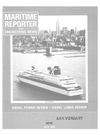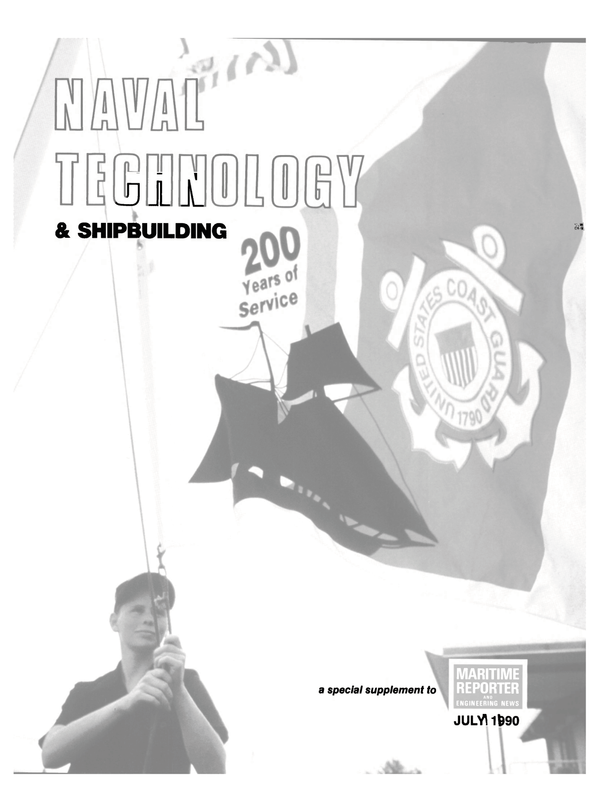
Our Third Century
Admiral J.W. Kime, Commandant, United States Coast Guard Editor's Note: Mm. John William Kime was recently named the 19th Commandant of the U.S. Coast Guard. He was nominated to the position while serving as Commander, Eleventh Coast Guard District, headquartered in Long Beach, Calif.
During that time he also served as the Commander of the Central California Sector of the U.S. Maritime Defense Zone, Pacific; and as Coordinator of the Pacific Region of the Pacific Region of the Office of National Drug Control Policy.
As the United States Coast Guard enters a third century of service to Americans, our future is as bright as it is challenging. Our anthem has a line that sums up our existence: "Semper Paratus (always ready) is our call." For two centuries of service, we have lived up to that goal.
Last year saw us answer the call many times. We answered the call from mariners in need of help 60,000 times. We answered the call to battle drug smugglers, and seized almost 33,000 pounds of cocaine and a quarter million pounds of marijuana.
Whether it was destruction by hurricanes like Hugo, or earthquakes in San Francisco, Coast Guard men and women were there to help.
Just as we tried to save people from the environment, so we tried to save the environment from people.
Large oil spills received national attention. But we also answered the call to another 8,000 oil and chemical spills last year. Large or small, the Coast Guard responded and did what we could. We can take pride in our accomplishments, but they are in the past.
Today we are working hard. Our men and women are knowledgeable and dedicated. Where do we go from here? Our watchword as we enter our third century must be balance.
We must recognize that all of our operational missions are equally important.
We cannot forget our humanitarian tradition. We are first and foremost "the lifesavers." Our roots are found in the brave men and women who risked their lives so that others might live. Our technology will change, but our commitment to saving lives and property will not.
Our leadership in maritime law enforcement is well established. Unfortunately, drugs will continue to plague the nation as the Coast Guard enters its third century. Fisheries are growing in importance, and that will continue. Our role in these missions will continue to grow, and we will continue to build partnerships with the Office of National Drug Control Policy, Department of Defense, Customs Service, Drug Enforcement Administration, and National Marine Fisheries Service.
In the mid-1980s we assembled the right mix of interdiction re resources and virtually shut down large shipments of marijuana across the Caribbean. We went from two or three motherships a week, with 20- 40-ton loads, to one or two ships a month, with 5 to 10-ton loads.
In the last 8-12 months, we have seen a dramatic decline in cocaine shipments across the Caribbean. Increased pressure in Colombia, increased Department of Defense resources have made the difference.
We wholeheartedly welcome the other armed services into this effort.
We have not won the war on drugs.
But we are winning an important battle. We need to keep the pressure on the Caribbean, and be ready as the smugglers shift to new methods.
In the future, the environment will take on greater importance for the nation and the Coast Guard. We must maintain our leadership role in both the national and international areas. We will improve our oil spill response capability. But we must also improve our ability to prevent spills. Equal parts of the balance must be operational readiness and regulatory prevention. Keep the oil in the ship if we can, but answer the call to clean it up if it gets out.
The Coast Guard needs to recognize the balance between operational and support functions. The pilots cannot fly to a rescue, the boat crews cannot search for drugs, and oil won't get cleaned up if the spare parts aren't ordered, the paperwork isn't completed, and the lawyers don't dot the "I's" and cross the "T's." Both elements need to be done right if we are to answer the call.
A good example of mission balance is the design of our new seagoing buoy tenders. The present fleet of 180-foot buoy tenders are all approaching 50 years of service—a good return on the taxpayers' dollars— but now the costs of maintenance and repair are getting prohibitive.
These ships need to be replaced.
Our engineers are working on a design for an oil-skimming capability. For the first time, this will provide the United States with an open-ocean skimming capability.
These vessels will be scattered in ports around the country and put to work servicing aids to navigation.
When an oil spill occurs, they can respond instantly to begin a cleanup operation. They will be an important segment in the joint effort to protect our environment.
As this is being written, Congress is in conference formalizing an oil spill bill. The final form is yet unknown, but both the House and Senate versions contain increased responsibilities for the Coast Guard.
More strike teams are needed to respond to spills. More vessel traffic systems are also required to prevent spills. Funding for equipment and personnel will need to be addressed, but it seems certain some form of this legislation will pass and be signed into law.
Our sister military services have been our partners in war and peace for many years. If changes in Europe cause the United States to draw down troop levels overseas, the importance of military sealift capability will grow. That means the Coast Guard's roles in port security and the maritime defense zone will remain part of our balance. As we have for our first two centuries, we will remain flexible and adapt to changing requirements.
Drug interdiction, maritime safety, environmental protection, and national security are all important, but the most important element we need for balance is people. We ask a great deal of our Coast Guard men and women. They willingly go into harms' way for the good of others.
They spend long hours serving their country, often separated from home and family for extended periods.
Taking proper care of them is the top responsibility for their Commandant.
Most Coast Guard stations are small, 20-25 people. Many are in areas with no big military bases nearby, no commissaries or military hospitals. Most of our people don't have access to military housing.
They are often stationed in resort areas because that is where the work is. But that is also an expensive place for a young seaman or petty officer to rent housing. We ask so much of them, we must ensure they get adequate housing and medical care. We must balance our operational needs with the needs of the people who answer our operation calls.
As we enter our third century, I see a strong Coast Guard with strong men and women carrying out vital missions. The future looks good. As always, there are challenges to be met and changes to be made. We have answered the call for two hundred years. The young men and women I have met throughout today's Coast Guard are our future, and they will uphold the great traditions of those who have gone before them.
Read Our Third Century in Pdf, Flash or Html5 edition of July 1990 Maritime Reporter
Other stories from July 1990 issue
Content
- Wartsila Diesel Announces Executive Appointments page: 10
- Chandris Celebrity's 'Horizon/ Built By Meyer Werft, Makes Her New York Debut page: 11
- Furuno Introduces New Autopilot, Compact, Lightweight Gyrocompass, And 10-Inch Color Video Sounder page: 11
- Radio Holland's Datamation: A Complete Integrated Ship Management System page: 13
- McDermott Awarded $27-Million Exxon Contract For Offshore Platform page: 13
- Avondale To Bid On Construction Of World's Largest Passenger Ship page: 14
- Singmarine Wins $16 Million Contract For New Chemical Tanker page: 15
- Hamilton Introduces Advanced Water Jet For Wide Range Of Vessels page: 16
- Halter Marine To Convert Supply Vessel For EPA Under $4.2-Million Pact page: 18
- Magnavox Introduces New Integrated GPS/Transit Satellite Navigation System page: 18
- Leevac Shipyards A w a r d ed Supply Boat Contract page: 19
- DIESEL POWER REVIEW page: 20
- MARINE LUBRICANTS page: 28
- U.S. Coast Guard Celebrates 200 Years Of Service page: 33
- Our Third Century page: 34
- Overview Of Coast Guard's Fiscal Year 1991 Request page: 36
- Willard Marine Continues Work With U.S. Coast Guard; Introduces SOLAS-Approved 18-Foot RIB page: 42
- Bollinger Receives $73.4-Million Modification To Build USCG Patrol Boats page: 42
- Morgan Crane Receives Order For Knucklebooms For Three Corvettes page: 43
- New Navy Report Outlines Potential Submarine Threat From Third World Nations page: 44
- US Navy Homeports Select Seaward Marine Fenders page: 44
- NORSHIPCO Completes Conversion of Crane Ship (T-ACS 9) For Navy page: 45
- Tano Marine Named Single System Vendor For T-AGS 45 page: 45
- Marinette Marine Launches Its Third MCM Vessel USS Patriot (MCM-7) page: 46
- Essex Machine Works Delivers New Steel Propeller Shafts For Coast Guard's 'Eagle' page: 48
- Viking Seminar Updates Skills of Service Representatives page: 48
- Global Marine Group Changes Company Name To GMG Systems, Inc. page: 53
- Robert Allan-Designed Hydrographic Survey Vessel Delivered By Allied Shipbuilders page: 54
- Aluminum Boats Constructing 140-Foot Dinner Yacht For Chicago page: 54
- Bender Awarded $3-Million Contract For Drill Rig Repair page: 55
- Cummins Diesels Power Cruise Vessel 'America' Delivered By Marine Builders page: 56
- ZF Introduces New Series Of Economical High-Horsepower Marine Transmissions page: 56
- $13-Million, Five-Boat Contract Completed By Moss Point Marine With Delivery Of Tugs To Jordan page: 58
- Deutz MWM Diesels To Power Four Harbor Tugs For Mexico page: 58
- Atlantic Marine Awarded $12.6-Million Contract To Build Three Sternwheel Dinner Vessels page: 59
- ABB Marine To Supply $50-Million Power Package To Fincantieri page: 59
- Blount Marine Delivers 192-Foot Dinner/Excursion Boat M / V Spirit Of Boston page: 60
- Canadian Government Report And New U.S. NOAA Administrator Publish Strong Swath Endorsements page: 61
- Master Marine Completes Repair, Maintenance On USCG Island Class Patrol Boats page: 62
- Trinity Marine To Build Three 220-Foot Supply Boats Under $15-Million Contract page: 62
- MTU-Powered High-Speed Catamaran, Built To New Flying Cat Design, Delivered By Kvaerner Fjellstrand page: 63
- COMSAT Expands Its Mobile Communications To New Ocean Region page: 63
- New Paint Factory For Sigma In Amsterdam page: 64
- Allied-Signal 'Spectra Shield' Panels For Marine Vessels Offer Maximum Ballistic Protection page: 64
- Textron Marine Systems Wins $6.5-Million Contract To Build Two SES Fireboats page: 65
- Congressional Conferees Near Compromise On Double-Hull Tanker Phase-In page: 66
- New Literature Available On Coffin Mechanical Seals For Turbo Pumps page: 67
- ABB Offers Eight-Page, Full-Color Brochure On Turbochargers page: 68
- Marco Shipyard Christens Fourth North Pacific Freezer Longliner page: 68
- Versatile Pacific Shipyards Uses N e w Launching Technique For Hydrographic Survey Ship page: 69
- L&C Associates Completes Deactivation Of M / V Cape Inscription page: 70


